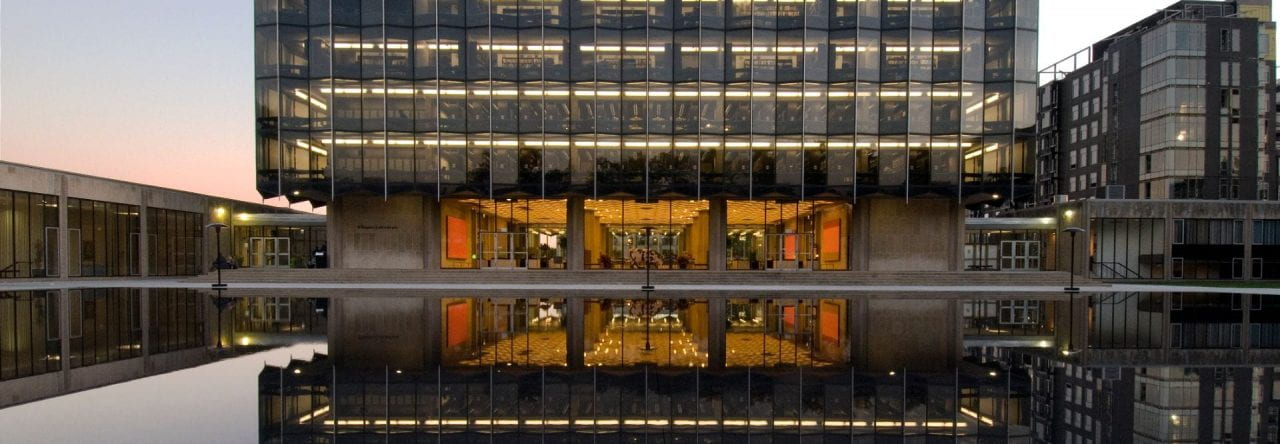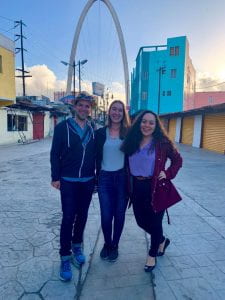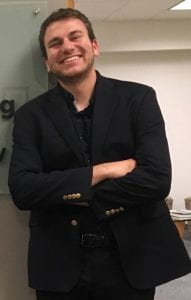What opportunities are there for pro bono work at a big law firm? Should you be working on pro bono cases as a summer associate? Does pro bono count towards the billable hour requirement in big law? We spoke with two attorneys who currently work in a big law setting to find out answers to these questions and more!
Meet the panelists:

Chris Bobby ‘18, is a tax associate at Skadden, Arps, Slate, Meagher & Flom LLP in Chicago.

Shehnaz Mansuri is the pro bono manager at Mayer Brown in Chicago, responsible for coordinating the office’s pro bono program.
Q: Can you tell us about your career path to your firm and, in general, the type of pro bono work you focus on?
Chris Bobby: I knew fairly early on (starting somewhere during my first year of law school) that I wanted to practice tax work. I chose Skadden initially because of the strength of their tax work and the group but also because of the culture and people at the firm. Within pro bono, I focus on a lot of transactional work, specifically the tax aspects of charitable organization 501(c)(3) formation and operation, as well as offer in compromise actions with state and federal tax authorities (a program which allows for individuals with unpaid tax debt to negotiate a settled amount that is less than the total owed to clear the debt). However, I also enjoy working where the need is highest, and have recently taken on several asylum and naturalization cases.
Shehnaz Mansuri: For 13 years, I was a trial attorney at a small boutique law firm in Chicago that focused on police accountability cases. I enjoyed working with students and wanted to be challenged professionally and got a job at the University of Chicago undergrad running the UChicago Public Interest Program. Shortly thereafter, a position opened up the law school for a Pro Bono Manager and I applied for the job and got it. After working at the Law School, I worked at DePaul University College of Law as the Director of Pro Bono and Community Service. As much as I enjoyed working with students, I wanted to get back into a law firm setting where I could work with lawyers more directly on pro bono projects.
Q: What caused you to become involved in pro bono?
Chris: I started getting involved in pro bono work my first year of law school following a career in education. Having worked in low-income school districts as a special education teacher and a dean of discipline, I initially focused on education-related pro bono work. During law school I specifically worked on representing kids in suspension hearings with Chicago public schools and also worked for an organization which represented children in guardian ad litem cases. Pro bono work gave me the opportunity to experience the work I did previously in a legal setting, while also gaining an appreciation for the broad array of issues facing at-risk adolescents beyond the educational setting.
Q: In your opinion, can students ask about pro bono work in an interview? If so, how and when?
Shehnaz: Yes, most big law firms have robust pro bono programs. You can talk about the pro bono work you do as a student and how it allows you to both help vulnerable communities and to develop important professional skills. You can ask questions about how pro bono work is integrated into the firm culture and if the firm has any signature causes or practices.
Chris: In my personal view, it is completely acceptable to ask about pro bono work in an interview. In fact, I would view it as a positive if a candidate were to ask about pro bono during a Skadden interview. To gain a sense of pro bono work at a given firm, I think the candidate should ask what kind of pro bono work the interviewers have engaged in at the firm and what kind of pro bono work is offered. Additionally, I think the best way to learn the extent to which a given firm supports pro bono is to ask the interviewers about their own experiences with pro bono at the firm, and what kind of projects they are working on or have worked on recently.
Q: Do you recommend summer associates/first year associates seek out pro bono work? How should they do so?
Chris: I definitely think summer and first year associates should seek out pro bono work in the firm setting. Not only does it provide for a rewarding community service experience, but it also offers young attorneys and attorneys-to-be a legal experience outside of the context of their normal firm work. Additionally, it provides greater insight into the culture of the firm and an opportunity to work with colleagues across practice areas and experiences.
Shehnaz: We host a pro bono orientation for summer associates where we discuss how to get involved in pro bono work. I encourage summer associates to reach out to me with any questions, and to discuss particular projects they want to work on. We also ask partners and associates to include pro bono projects in the case list/database that summer associates use during the summer.
Q: Do you see any trends in pro bono work (in general or at your firm?)
Shehnaz: Under the current circumstances, firms are looking for remote opportunities for attorneys and finding creative ways to serve vulnerable populations.
Chris: I think there has been a big trend towards immigration work following many of the executive actions by our current presidential administration. I think these will continue at least while the current administration is in office, but one may see the trend continue following another executive’s tenure. For example, in my own practice I have seen a rise in asylum, naturalization, and other immigration status related cases. In one specific case, a client’s officer-in-compromise request with the New York State Department of Taxation and Finance was spurred by his desire to apply for naturalization. I think it is likely that we will see more trends, at least in the short-term, caused by the current coronavirus pandemic. For example, we may see more transactional work aimed at helping small businesses, charitable organizations, and other thinly capitalized groups given the current financial stressors caused by the fallout from the virus.
Q: Can you describe one recent (or most memorable) pro bono project? How did that project build your skill set or connections within the firm/legal community?
Chris: Recently I worked on an offer in compromise case for an individual seeking to apply for U.S. citizenship. The individual didn’t realize that he had to file state income tax returns for years 1988 and 1990, which, due mostly to the accrued interest and penalties, amounted to over $500,000 in unpaid taxes. The individual could not apply for citizenship until he paid his tax liability, but unfortunately, being on a fixed income, could in no way afford to do so. Typically, we would work with the state tax authorities on his behalf to come to an agreed-upon settlement amount that would satisfy both parties. However, after researching the state collections statutes in further detail, we were able to determine that the statute of limitations on collection of the unpaid taxes for both years was about to run. Thus, the individual was able to eliminate his outstanding tax liability without having to pay any amount. This was great for the client, as he could now apply for citizenship and did not have to worry about exhausting his means of supporting himself in the process. The experience of entering the project expecting to write an offer in compromise letter but finding a more efficient and cost-effective solution for our client was an invaluable lesson on the value of creative legal thinking, and that sometimes the best solution may exist outside of the usual confines one expects to use to fix a given problem.
Q: May summer associates work on pro bono matters at your firm?
Shehnaz: Yes, we encourage summer associates to work on pro bono projects at Mayer Brown. These projects help associates develop key professional skills and help them continue pro bono work when they come on full time.
Chris: Yes, summer associates are encouraged to work on pro bono matters at Skadden. The firm tries to provide as many opportunities as possible to get summer associates involved in pro bono.
Q: Does your firm provide institutional support for pro bono? (designated pro bono counsel/partner, pro bono managers/coordinators?)
Chris: In our New York office, our firm has a designated pro bono counsel that runs the pro bono program for the entire firm. In the Chicago office, Skadden has a pro bono coordinator, as well as other professional staff that aid in pro bono management and coordination. Furthermore, Skadden has developed partnerships with pro bono organization in the various locations where offices exist. Another significant factor in Skadden’s institutional support for pro bono is the unlimited amount of hours that can be used to hit an associates’ yearly billable goal.
Shehnaz: At Mayer Brown, we have a Pro Bono Director and Pro Bono Coordinator, both based in DC, and a Pro Bono Manager (me) based in Chicago.
Q: Does your firm have a written pro bono policy?
Shehnaz: Yes, we define what work qualifies as pro bono, and also have a process to run conflicts and open pro bono matters.
Chris: Skadden has written policies and procedures for common issues relating to pro bono matters, including taking on new matters, opening and closing matters, using the firm name, expenses, etc.
Q: Does your firm credit pro bono hours on the same basis as billable hours? Cap on how many hours can count towards billable goal (if any)?
Chris: At Skadden, pro bono hours can be billed on the same basis as billable hours. There is no cap on how many pro bono hours can count towards an associate’s billable goal.
Shehnaz: Attorneys get credit for their pro bono hours at Mayer Brown.
Q: Does your firm offer transactional pro bono opportunities?
Shehnaz: We offer a range of pro bono opportunities, including transactional opportunities. These opportunities often involve work that our associates do for paying clients so they are comfortable and confident taking it on for pro bono clients.
Chris: Yes, I’ve personally worked on transactional pro bono opportunities, including helping an organization incorporate as a 501(c)(3), offering advice on the tax status of various real estate transactions for a charity, and helping fixed-income clients compromise with the IRS on outstanding tax liabilities.
Q: How have you personally benefited from doing pro bono work?
Chris: Engaging in pro bono work at my firm has been invaluable in terms of collaborating with individuals outside of my usual working groups and also expanding my skill set as an attorney. Pro bono has allowed me to meet individuals in my office in other practice groups as well as collaborate with other tax attorneys in the various Skadden offices. This experience has allowed me to build connections that have resulted in future work with attorneys I otherwise would not have had the opportunity to engage with. Additionally, pro bono has given me the opportunity to expand my knowledge of the tax code, specifically with regard to charitable contributions, deductions, and organizational formation and operation. However, the most important benefit of engaging in pro bono at my firm has been the opportunity to engage in work that is meaningful and fulfilling in ways much different than the work I typically provide for the firm. Pro bono has been a natural means to participate in work I find socially meaningful, and a supportive firm provides ample opportunity to engage in such work.








